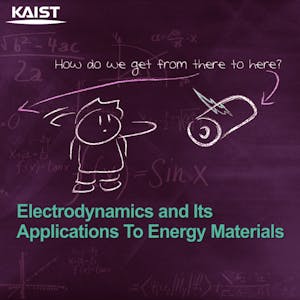This course delves into the advanced concepts of electrodynamics, focusing on the interplay between electric and magnetic fields. Building upon foundational knowledge, learners will explore magnetostatics, electromotive force, and their applications in various scientific and engineering disciplines.
Key topics covered in this course include:
Emphasizing practical relevance, the course provides insights into the applications of electrodynamics in fields such as materials science, information technology, electrical engineering, and energy-related disciplines. By connecting theoretical concepts to real-world scenarios, this course equips learners with a well-rounded understanding of electric and magnetic fields and their diverse applications.
Certificate Available ✔
Get Started / More Info
Electrodynamics: Electric and Magnetic Fields comprises modules that delve into electrostatic analogs, magnetostatics, vector potential, quantum mechanics, and induced currents, ultimately relating these concepts to practical applications in diverse fields.
This module introduces electrostatic analogs, providing insights into modeling heat flow and membranes as analogs for electric fields. Key topics covered in this module include different spherical solutions, values of physical constants, and a comprehensive set of lecture slides. Learners will engage in a quiz at the end of the module to reinforce their understanding.
In this module, learners will delve into magnetostatics, gaining a deeper understanding of magnetic fields and forces, as well as interactions with magnetic fields. The module also includes lecture slides and a quiz to assess comprehension.
Building upon the foundational knowledge of magnetostatics, this module delves into the vector potential and its applications in specific geometries. Learners will explore the vector potentials for various geometries, enhancing their understanding through lecture slides and a quiz.
This module focuses on assessing the vector potential, comparing mechanical and electrical energy, and exploring the connection between quantum mechanics and dynamics. It provides a comprehensive understanding of these concepts through lecture slides and a quiz.
Exploring induced currents, this module delves into the practical applications of electromotive force. Learners will gain insights into running motors, forces generated from induced currents, and their implications. The module concludes with lecture slides and a quiz to reinforce learning.
Digital Signal Processing is a comprehensive specialization covering discrete-time signals, Fourier transform analysis, digital filters, and real-time DSP implementation...
Real-Time Embedded Systems specialization offers comprehensive training in real-time theory, analysis, and practical implementation for embedded systems, preparing...
Introduction to Embedded Systems Software and Development Environments is a hands-on course focusing on ARM based Microcontrollers, software configuration management,...
Sensor Manufacturing and Process Control covers sensor characterization, manufacturing techniques, and PID control for motor applications.